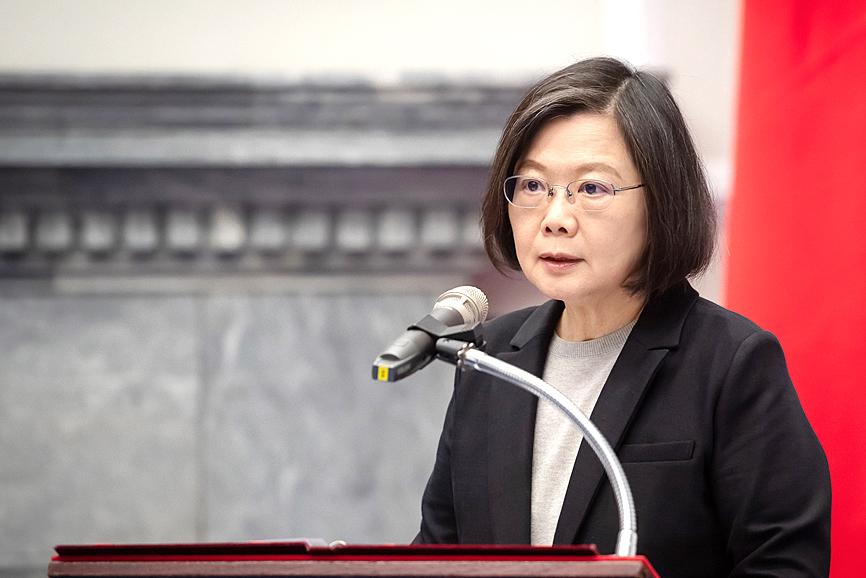President Tsai Ing-wen (蔡英文) ranked ninth on Forbes magazine’s list of the most powerful women in the world, moving up 28 spots from last year’s ranking.
Forbes highlighted that Tsai became Taiwan’s first female and unmarried leader in 2016, and was re-elected last year with more than 57 percent of the popular vote.
The magazine said her re-election was a “rebuke to Beijing’s efforts to control the island.”

Photo: EPA-EFE
Tsai has made protocol-breaking overtures to the US, which has created tensions with China, it said.
Forbes commended her leadership during the COVID-19 pandemic and her efforts in stimulating the economy with initiatives focused on biotechnology, defense and green energy to make Taiwan “an indispensable member of the world.”
Tsai made the list for the sixth-straight year since her first listing in 2016, when she was ranked 17th. Last year, she was 37th.
Advanced Micro Devices (AMD) president and CEO Lisa Su (蘇姿丰), who was born in Tainan and migrated to the US as a child, ranked 49th on this year’s list.
Under Su, who trained as an electrical engineer, AMD’s stock price has risen more than 25-fold, Forbes said, adding that the company made one of the greatest turnarounds in the technology sector in the past few years.
US novelist and philanthropist Mackenzie Scott topped the list, after she in 2019 pledged to give away half of her wealth.
Scott, the former wife of Amazon founder Jeff Bezos, has thus far donated about US$8 billion to more than 500 nonprofit organizations, including US$2.74 billion granted to 286 groups in June, the magazine said.
US Vice President Kamala Harris ranked second, after she early last year was the first black and Asian-American woman to assume the second-highest office in the country, it said.

The Grand Hotel Taipei on Saturday confirmed that its information system had been illegally accessed and expressed its deepest apologies for the concern it has caused its customers, adding that the issue is being investigated by the Ministry of Justice Investigation Bureau. The hotel said that on Tuesday last week, it had discovered an external illegal intrusion into its information system. An initial digital forensic investigation confirmed that parts of the system had been accessed, it said, adding that the possibility that some customer data were stolen and leaked could not be ruled out. The actual scope and content of the affected data

‘LIKE-MINDED PARTNER’: Tako van Popta said it would be inappropriate to delay signing the deal with Taiwan because of China, adding he would promote the issue Canadian senators have stressed Taiwan’s importance for international trade and expressed enthusiasm for ensuring the Taiwan-Canada trade cooperation framework agreement is implemented this year. Representative to Canada Harry Tseng (曾厚仁) in an interview with the Central News Agency (CNA) said he was increasingly uneasy about Ottawa’s delays in signing the agreement, especially as Ottawa has warmed toward Beijing. There are “no negotiations left. Not only [is it] initialed, we have three versions of the text ready: English, French and Mandarin,” Tseng said. “That tells you how close we are to the final signature.” Tseng said that he hoped Canadian Prime Minister Mark Carney

POSITIVE DEVELOPMENT: Japan and the US are expected to hold in-depth discussions on Taiwan-related issues during the meeting next month, Japanese sources said The holding of a Japan-US leaders’ meeting ahead of US President Donald Trump’s visit to China is positive news for Taiwan, former Japan-Taiwan Exchange Association representative Hiroyasu Izumi said yesterday. After the Liberal Democratic Party’s landslide victory in Japan’s House of Representatives election, Japanese Prime Minister Sanae Takaichi is scheduled to visit the US next month, where she is to meet with Trump ahead of the US president’s planned visit to China from March 31 to April 2 for a meeting with Chinese President Xi Jinping (習近平). Japan and the US are expected to hold in-depth discussions on Taiwan-related issues during the

President William Lai (賴清德) yesterday bestowed one of Taiwan’s highest honors on Saint Vincent and the Grenadines (SVG) Ambassador Andrea Clare Bowman in recognition of her contributions to bilateral ties. “By conferring the Order of Brilliant Star with Grand Cordon on Ambassador Bowman today, I want to sincerely thank her, on behalf of the Taiwanese people, for her outstanding contribution to deepening diplomatic ties between Taiwan and SVG,” Lai said at a ceremony held at the Presidential Office in Taipei. He noted that Bowman became SVG’s first ambassador to Taiwan in 2019 and